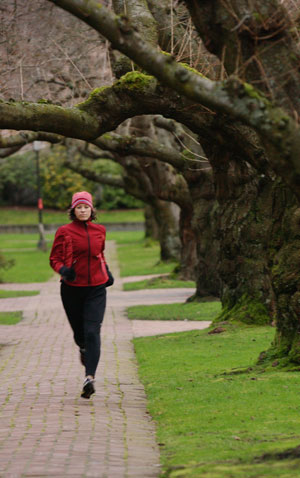Exercise-Induced Bronchoconstriction (EIB)
Exercise-induced bronchoconstriction (EIB) is a lung condition. EIB is when the tubes
that bring air in and out of the lungs suddenly get narrow when you exercise. It is
sometimes called exercise-induced asthma.
You may have EIB if any of these occur after 5 to 10 minutes of exercise:
-
You start to cough
-
Your chests feel tight, or you feel chest pain
-
You have trouble breathing
-
You have wheezing
-
You feel too short of breath
EIB can occur in people who don’t have asthma. EIB can even occur in healthy athletes
who don’t have asthma. It can also occur in people who have allergies. Exercise can
also make asthma symptoms worse in most people who do have asthma.
Triggers

Experts don't fully know what causes EIB. Breathing in cold, dry, or polluted air
is a risk factor. More air enters the lungs through the mouth, instead of the nose,
during exercise. The air isn’t warm or moist like air that enters through the nose.
The cold dry air can cause the airways to narrow.
Other risk factors, along with asthma, for EIB include:
-
Sensitivity to cold, dry, or polluted air
-
Allergies that aren't well controlled, especially for nasal allergies
-
High pollen levels
-
Respiratory infection (viral)
Symptoms
You may have symptoms within minutes of starting to exercise if you have EIB. The
symptoms are the same as asthma symptoms.
They may include:
Some people have problems with their vocal cords. This causes symptoms that can seem
like EIB. However, medicines and remedies for EIB are often not helpful for vocal
cord problems. There are treatments for vocal cord problems. Talk to your healthcare
provider if you think you may have vocal cord problems instead of EIB.
The diagnosis
Your healthcare provider will ask about your health history. You will also have a
physical exam. You may have tests to see how well your lungs work. The most common
test is spirometry. Your breathing will be checked at rest. And during exercise. This
is called an exercise-challenge test.
Your healthcare provider may advise you to take medicine before or during exercise.
You may take an inhaled medicine, such as albuterol. This type of medicine is called
a rescue or quick-relief medicine. It is used about 15 minutes before exercising.
It may also be taken again during or after exercise, if needed.
You may already use controller medicines if you have asthma. This type of medicine
is taken regularly to help prevent symptoms. Inhaled steroids are the most common
type. Your healthcare provider may prescribe one for you if you don't already use
this kind of medicine. They may want you to take it if rescue medicines are not working.
Managing EIB
Living with EIB doesn’t mean you need to give up exercise. Exercise is important for
good health. It also helps keep your lungs, heart, and the muscles used for breathing
strong. Your body needs exercise. Ask your healthcare provider how to exercise safely
and with as few symptoms as possible. Most people who have EIB can exercise safely.
Here are tips:
-
Talk with your provider about what exercise is safe for you.
-
Take medicines before exercise, as prescribed.
-
See your healthcare provider if your symptoms get worse or happen more often.
-
Ask your healthcare provider, nurse, or pharmacist to show you how to correctly use
your inhaler. An inhaler is also called a metered-dose inhaler.
-
Ask your healthcare provider or pharmacist to explain how to use your medicines, inhaler,
or both. Write this information down.
-
Tell your exercise partner about your EIB and what to do in an emergency.
What you can do
Along with taking medicines, these things can help prevent or ease symptoms of EIB:
-
Don’t exercise outside on cold, dry days. Cover your mouth with a mask or scarf if
you are outside in cold weather.
-
Don’t exercise outside when there is a lot of pollen or air pollution. Exercise indoors
instead.
-
Don't smoke. Ask your healthcare provider for help quitting.
-
Don't exercise when you are sick or when your allergies are bad.
-
Start an exercise program slowly if you haven’t exercised in a while. Slowly increase
how hard and how long you exercise.
-
Warm up and cool down before and after exercise.
-
Try different activities. See which ones work best for you. You may do better with
activities that are done in warm places or only need short bursts of energy. These
include swimming, walking, hiking, baseball, or golf.
-
Take breaks and drink water before, during, and after exercise.
When to call your healthcare provider
Call your healthcare provider right away if:
-
You are taking medicines for EIB, and you are still having symptoms, such as:
-
You have any questions about your medicines or exercise activities
Asthma from any cause that is not under control can be very serious. It can be life-threatening.
You may need to be treated in an emergency room. You may need to stay in the hospital.
EIB can get in the way of an athlete's ability to take part in sports. But exercise
is important. It gives many health benefits, especially for people with asthma. So
don’t give up on an active lifestyle.
Call 911
Call 911 right away if:
-
You have trouble breathing, fast breathing, or shortness of breath that doesn't get
better with treatments
-
You have trouble talking or speaking
-
Your inhaler is not working. And your symptoms are worse.
-
You feel drowsy, dizzy, lightheaded, or confused
-
Your finger or lips are turning blue, purple, or gray (pale)
-
Your peak flow is worse after a treatment or as advised by your healthcare provider
and Asthma Action Plan